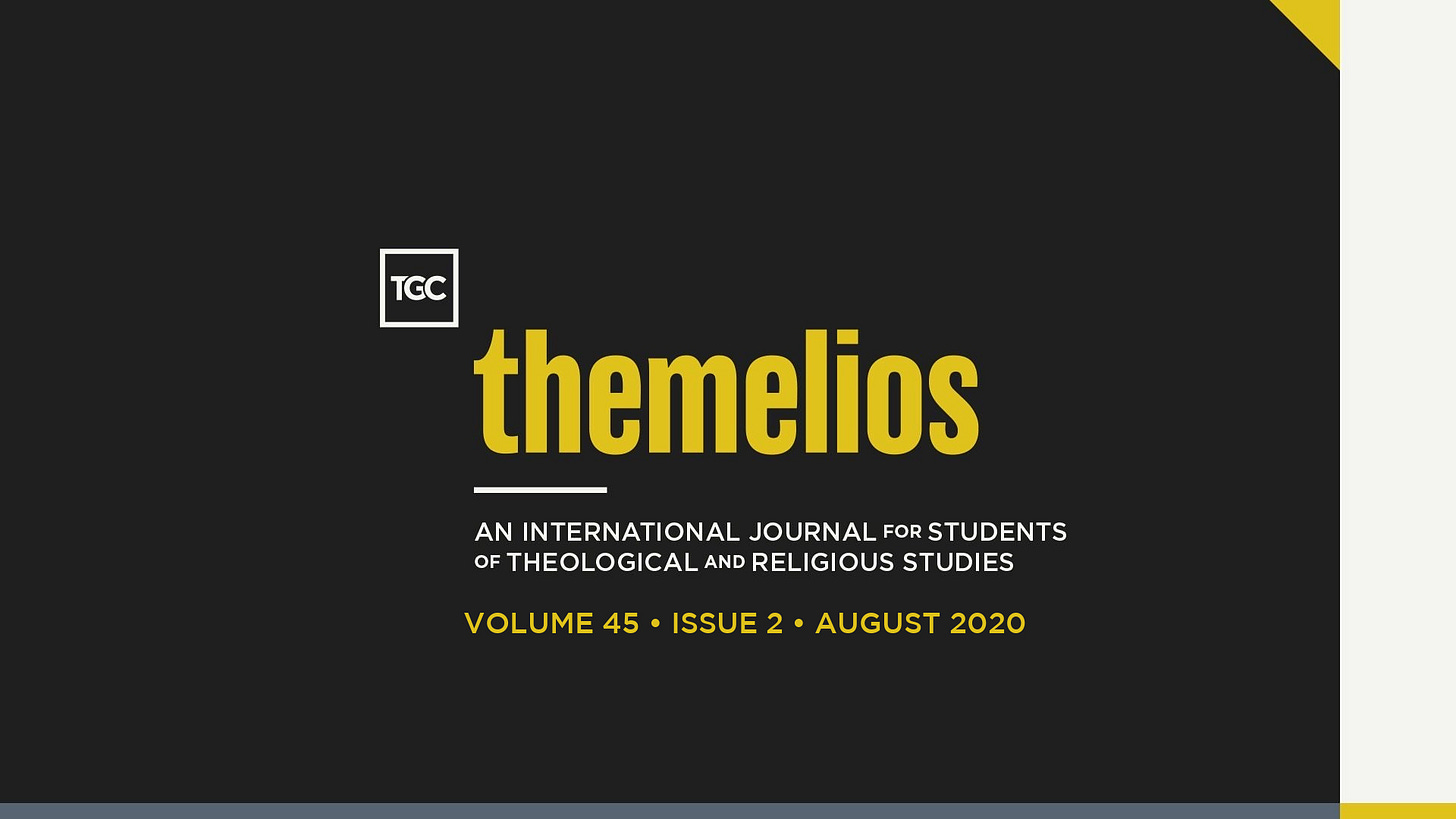Fraud in TGC's Themelios
By John B. Carpenter
It's not salacious—no Jeffrey Epstein-like debauchery, no seven-figure embezzlement—but it's still a scandal. The Gospel Coalition's (TGC) flagship journal, Themelios, which TGC consistently promotes as "peer-reviewed," breaks de facto contracts with writers and discriminates against Baptists, overriding the verdicts of their expert reviewers while claiming to produce a legitimate "peer-reviewed journal." And TGC touts it proudly.
Broken Promises
On June 3, 2024, Brian Tabb, the general editor, wrote to me: "I'm pleased to accept your essay... for publication in Themelios." This was an unequivocal commitment requiring no stipulations. Echoing this promise, J.V. Fesko, Themelios' managing editor, assured me that my essay "will appear in the... journal." "Will" is absolute—the deal was done.
Under the Uniform Electronic Transactions Act, these commitments carry the force of a verbal contract and could be legally enforced. Even by secular standards, Themelios' broken contract is, in legalese, “actionable.” That is, I could sue. Instead, I’m choosing to expose them, hoping your disapproval of their actions will be punishment enough.
Anti-Baptist Bias
Fesko appears to be using his editorial position to suppress Baptist essays that challenge paedobaptist Reformed theology. The essay he opposed exposed weaknesses in his theological position. Rather than engaging the arguments or asking alternative scholars to rebut me, he obfuscated and ultimately used his authority to suppress the piece, overriding their own expert reviewer.
This bias shouldn't surprise anyone familiar with his book Word, Water, and Spirit: A Reformed Perspective on Baptism (Reformation Heritage Books, 2010), where his anti-Baptist prejudice is unmistakable. Fesko assumes baptism functions as a covenant sign and implies Baptists are benighted for rejecting this assumption. He dismisses Tertullian's protest against infant baptism simply because Baptists cite this evidence while rejecting other aspects of Tertullian's baptismal theology.
Most tellingly, Fesko scorns Wayne Grudem for allegedly failing to define "grace" precisely when praising God that our blessings are "all of grace" (p. 265). In reality, Grudem provides a precise definition of grace elsewhere in his 1994 Systematic Theology (p. 729). Fesko ignored Grudem's actual definition, twisted a genuine expression of praise, and mocked Grudem for showing "little definition or qualification."
Fesko also claims Particular Baptists fell "short of the historic Reformed tradition," citing Richard Muller (p. 155, fn. 73). However, Muller—my former professor—actually affirms the Reformed identity of Particular Baptists. Finally, Fesko ridicules Baptists for throwing "out the water in their effort to toss out the baby" (p. 153).
Does anyone reading such mockery believe Fesko will treat Baptist contributors fairly? Incredibly, TGC thought it would be a good idea to put him in charge of a interdenominational journal.
Stolen Academic Valor
Most people are going to assume that when TGC’s lauds Themelios' for being “peer-reviewed” that they mean essays are evaluated by experts through blind review — reviewers judge submissions without knowing the authors' identities -- to minimize editorial bias, such as when an editor harbors anti-Baptist prejudice. They’ll assume that the experts have the decisive voice in publication, that articles are published because they are excellent, not because a “Big Eva” celebrity pastor wrote it or that happens to appeal to the editor’s sectarian bigotry. But Themelios operates differently. A board member admitted, “Brian Tabb has sometimes published essays which I rated poorly.” Meanwhile, Fesko selects essays like Kevin DeYoung's piece on—predictably—Presbyterian history. Essays approved by reviewers, like mine, face Fesko's protests and Tabb's vetoes. Themelios’s expert reviewer concluded my essay was "well researched, covers the material adequately, and is presented in a logical format that makes it easy for the reader to follow." Despite this positive assessment, Fesko rejected their expert's judgment to suppress it. Promoting this process as "peer-reviewed" is, if not outright fraud, at least suggestively stolen academic valor.
Why This Matters
This may seem far removed from your daily life, but consider the implications. When our Christian institutions are staffed by scholars, editors, pastors, and professors who lie to contributors, discriminate against theological traditions they dislike, engage in scholarly deception, break contracts, and misrepresent their processes, the spiritual wreckage will eventually reach you and your church.
John B. Carpenter (@CovenantReform2), Ph.D., is pastor of Covenant Reformed Baptist Church and author of Seven Pillars of a Biblical Church and the Covenant Caswell substack.


